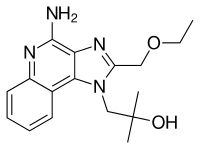Resiquimod
Resiquimod (R-848) is a drug that acts as an immune response modifier, and has antiviral and antitumour activity. It is used as a topical gel[1] in the treatment of skin lesions[2] such as those caused by the herpes simplex virus[3][4] and cutaneous T cell lymphoma,[5] and as an adjuvant to increase the effectiveness of vaccines.[6] Systemic administration has also been demonstrated through nanoparticle encapsulation, resulting in effective cancer immunotherapy through stimulation of tumor-associated macrophages.[7] It has several mechanisms of action, being both an agonist for toll-like receptor 7 and 8,[8] and an upregulator of the opioid growth factor receptor.[9] On 28 April 2016, orphan designation (EU/3/16/1653) was granted by the European Commission to Galderma R&D, France for resiquimod to be used in the treatment of cutaneous T-cell lymphoma. [10]
 | |
| Clinical data | |
|---|---|
| Routes of administration | Topical |
| ATC code |
|
| Legal status | |
| Legal status |
|
| Identifiers | |
IUPAC name
| |
| CAS Number | |
| PubChem CID | |
| IUPHAR/BPS | |
| ChemSpider | |
| UNII | |
| ChEMBL | |
| CompTox Dashboard (EPA) | |
| Chemical and physical data | |
| Formula | C17H22N4O2 |
| Molar mass | 314.382 g/mol g·mol−1 |
| 3D model (JSmol) | |
SMILES
| |
InChI
| |
| | |
See also
- Imiquimod
- Gardiquimod
References
- Patents #5, 939, 090 and 6, 365, 166
- Szeimies RM, Bichel J, Ortonne JP, Stockfleth E, Lee J, Meng TC (July 2008). "A phase II dose-ranging study of topical resiquimod to treat actinic keratosis". The British Journal of Dermatology. 159 (1): 205–10. doi:10.1111/j.1365-2133.2008.08615.x. PMID 18476957.
- Wu JJ, Huang DB, Tyring SK (November 2004). "Resiquimod: a new immune response modifier with potential as a vaccine adjuvant for Th1 immune responses". Antiviral Research. 64 (2): 79–83. doi:10.1016/j.antiviral.2004.07.002. PMID 15498602.
- Fife KH, Meng TC, Ferris DG, Liu P (February 2008). "Effect of resiquimod 0.01% gel on lesion healing and viral shedding when applied to genital herpes lesions". Antimicrobial Agents and Chemotherapy. 52 (2): 477–82. doi:10.1128/AAC.01173-07. PMC 2224757. PMID 18039918.
- Rook AH, Gelfand JC, Wysocka M, Troxel AB, Benoit B, Surber C, Elenitsas R, Buchanan MA, Leahy DS, Watanabe R, Kirsch I, Kim EJ, Clark RA (July 30, 2015). "Topical resiquimod can induce disease regression, eradicate malignant T cells and enhance T cell effector functions in cutaneous T cell lymphoma". Blood. 126 (12): 1452–1461. doi:10.1182/blood-2015-02-630335. PMC 4573868. PMID 26228486.
- Tomai MA, Miller RL, Lipson KE, Kieper WC, Zarraga IE, Vasilakos JP (October 2007). "Resiquimod and other immune response modifiers as vaccine adjuvants". Expert Review of Vaccines. 6 (5): 835–47. doi:10.1586/14760584.6.5.835. PMID 17931162.
- Rodell, Christopher B.; Arlauckas, Sean P.; Cuccarese, Michael F.; Garris, Christopher S.; Li, Ran; Ahmed, Maaz S.; Kohler, Rainer H.; Pittet, Mikael J.; Weissleder, Ralph (2018-05-21). "TLR7/8-agonist-loaded nanoparticles promote the polarization of tumour-associated macrophages to enhance cancer immunotherapy". Nature Biomedical Engineering. 2 (8): 578–588. doi:10.1038/s41551-018-0236-8. ISSN 2157-846X.
- Hurst J, Prinz N, Lorenz M, Bauer S, Chapman J, Lackner KJ, von Landenberg P (February 2009). "TLR7 and TLR8 ligands and antiphospholipid antibodies show synergistic effects on the induction of IL-1beta and caspase-1 in monocytes and dendritic cells". Immunobiology. 214 (8): 683–91. doi:10.1016/j.imbio.2008.12.003. PMID 19249118.
- Zagon IS, Donahue RN, Rogosnitzky M, McLaughlin PJ (August 2008). "Imiquimod upregulates the opioid growth factor receptor to inhibit cell proliferation independent of immune function". Experimental Biology and Medicine (Maywood, N.J.). 233 (8): 968–79. doi:10.3181/0802-RM-58. PMID 18480416.
- http://www.ema.europa.eu/docs/en_GB/document_library/Orphan_designation/2016/05/WC500207498.pdf